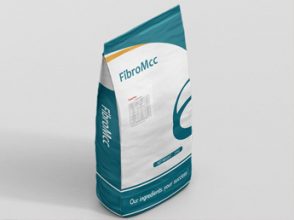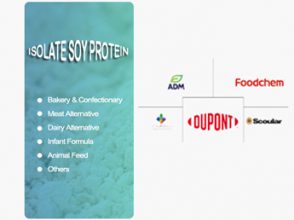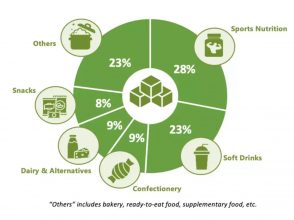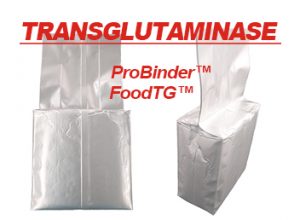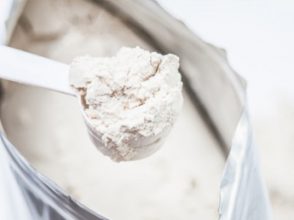The nutritional value of spirulina lies in its high protein content, high digestibility, and high absorption efficiency. The protein content of spirulina is up to 68% to 72%, and the protein of spirulina is water-soluble and has all the advantages of animal protein. According to the digestion experiments of the researchers, the digestibility coefficient of spirulina reached 83% -85%.
Spirulina protein content, net utilization, digestibility coefficient compared with other foods
| Spirulina and humans have major animal and plant protein, fat and carbohydrate content compared% | ||||
|---|---|---|---|---|
| Type | protein |
fat |
carbohydrate |
|
| Spirulina | 67 |
6.7 |
16 |
|
| Cereals | Wheat |
13-16 |
3-5 |
75 |
Rice |
8-10 |
2-3 |
73-78 |
|
Millet |
7-10 |
3-4 |
70 |
|
Soybean |
39-43 |
17-20 |
26-28 |
|
Corn |
5-9 |
4-4.5 |
72-75 |
|
| Animals | pork |
9.5 |
59.8 |
0.9 |
beef |
20.1 |
10.2 |
- |
|
chicken |
21.5 |
2.5 |
0.7 |
|
duck |
16.5 |
7.5 |
0.5 |
|
fish |
17-18 |
0.8-3.6 |
- |
|
egg |
14.7 |
11.6 |
1.6 |
|
milk |
3.3 |
4.0 |
5.0 |
|
Another characteristic of Spirulina is low fat, low calories, and no low-density cholesterol (LDL), which is undoubtedly a major contribution to the health plan of modern people.
18 important amino acids
Protein is spirulina composed of amino acids. Spirulina contains all 18 amino acids that the human body needs, so nutrition experts call it a full-price protein nutrient.
| Spirulina main amino acid composition and FAO / WHO recommended model comparison (16g nitrogen dry algae calculation) |
||||||||
|---|---|---|---|---|---|---|---|---|
| source | Valine |
Leucine |
Isoleucine |
Phenylalanine |
Lysine |
Methionine + Cystine |
Tryptophan |
Threonine |
| FAO / WHO | 4.96 |
7.04 |
4.0 |
6.08 |
5.44 |
3.52 |
0.96 |
4.0 |
| Spirulina platensis | 5.70 |
7.95 |
4.93 |
3.63 |
4.34 |
2.78 |
0.88 |
4.02 |
Of the 18 important amino acid compositions contained in spirulina, 10 are essential amino acids recommended by the Food and Agriculture Organization of the United Nations (FAO) and the World Health Organization (WHO). Curiously, in the algal biomass of spirulina, its amino acid composition and content are basically similar to those recommended by FAO / WHO for human protein and amino acid intake.
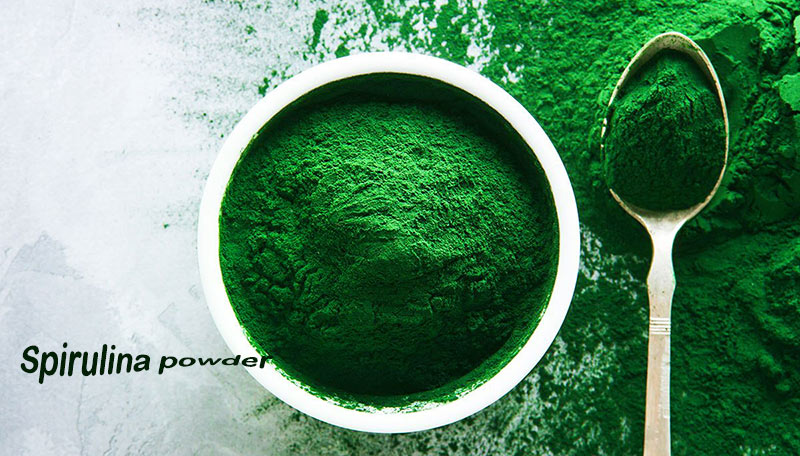
Resources of many important vitamins
Spirulina is concentrated with a variety of important vitamins needed by the human body for physiological activities. It contains both water-soluble vitamins, such as vitamin B1, vitamin B6, vitamin B12, pantothenic acid, biotin and folic acid, as well as fat-soluble vitamin A and vitamin E.
| Types | 10g spirulina powder content | Recommended daily food intake | Accounted for the recommended daily food intake (%) |
|---|---|---|---|
| Vitamin A (β-carotene) | 23000international unit |
5000international unit |
460 |
| Vitamin B1 | 0.31mg |
1.5mg |
21 |
| Vitamin B2 | 0.35mg |
1.7mg |
21 |
| Vitamin B3 | 1.46mg |
20mg |
7 |
| Vitamin B6 | 80μg |
2mg |
4 |
| Vitamin B12 | 32μg |
6μg |
533 |
| Vitamin C | -- |
60mg |
|
| Vitamin D | -- |
400international unit |
|
| Vitamin E | 1.1international unit |
30international unit |
4 |
| Folic Acid | 81mg |
400mg |
21 |
| Pantothenic acid | 10mg |
10mg |
|
| Biotin | 0.5mg |
||
| Inositol | 0.4mg |
Vitamin B12 in spirulina is a vital element with vital physiological functions involved in the production of bone marrow erythrocytes, preventing pernicious anemia, and preventing damage to brain nerves.
The average content of natural vitamin B12 per kilogram of spirulina dried algae reaches 5 mg, and after being absorbed by the human body, the effective amount of spirulina vitamin B12 is as high as 20%, exceeding that of all vitamin B12 in other plants.
Five health factors in spirulina
1.Huge physical nutrition library-animal starch polysaccharides
After ingestion, spirulina is mainly stored in the liver and muscle tissue of the human body. When the body's functional metabolism is needed, they can directly provide glycogen to the muscle tissue to generate energy, so that the body can gain explosive power and endurance. The advantage of this animal starch polysaccharide is that it does not increase the burden of the pancreas and does not produce hypoglycemia. This is very important for athletes, actors and other people with large physical consumption.
2. The body's powerful health factors-polyunsaturated fatty acids
The lipids in spirulina algae-abundant natural unsaturated fatty acids (polyunsaturated fatty acids, PUFAs), are almost all important unsaturated fatty acids, and their cholesterol content is extremely low (<196 mg/kg). At the same time, it is also rich in γ-linolenic acid. In the conventional algae species produced by spirulina, its highest content even accounts for 40% of the total fatty acids.
3.Antioxidant β-carotene that enhances the body's immune defense function
Spirulina carotenoids have fat-soluble properties that are insoluble in water and only soluble in oil, and can play a more stable role in human tissues. Every 20 grams of spirulina dried algae contains about 30 milligrams of beta-carotene, and the equivalent amount of beef liver is only 1/4 of its content, and the content in pig liver is only 16 milligrams. Therefore, ordinary adults only need to consume 2.5 grams of spirulina per day to fully meet the needs of human nutrition and metabolism for β-carotene.
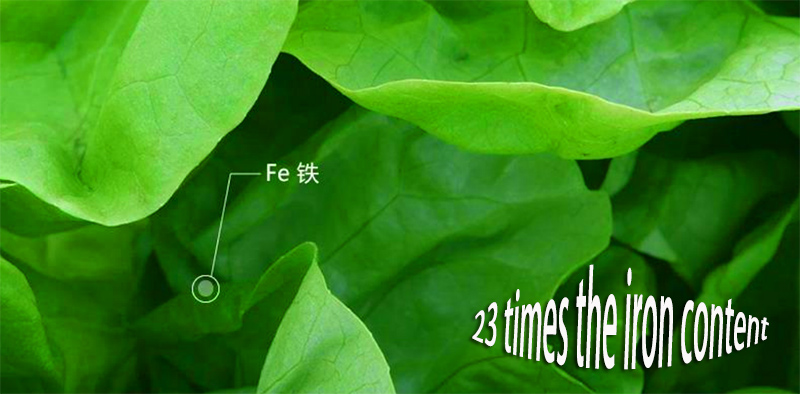
4.Human body's green blood——Spirulina chlorophyll a
Spirulina's natural A-type chlorophyll is called human's natural heme resource, and its content accounts for 1.1% of the total algae body, which is 2-3 times the chlorophyll content of most land plants and 10 times that of ordinary vegetables. Spirulina's chlorophyll a, together with its high-quality protein, can be used as a direct supplement to human heme; more because spirulina's cell walls and cell membranes are composed of polysaccharides, so after eating spirulina, people can immediately be taken It is transformed into the heme of the human body, so spirulina chlorophyll a can be called human "green blood".
5.Human body's "patriotic missile"-SOD
SOD is an important enzyme for the body to defend against superoxide radical molecules. Among the active biomass of spirulina, SOD is particularly abundant. In 10 grams of fresh spirulina (dry biomass), it contains 10 000 to 37 500 IU (international unit). According to the measurement of more than 10 domestic algal powder samples by the Chinese Academy of Agricultural Sciences in 2011, the average value of SOD reached 1 930 IU / g (dry algae).
SOD is the nemesis of peroxide-free radicals in the human body. Since the advent of spirulina, many people who have taken it for many years (usually taking 4 to 6 grams a day) have found that their appearance has become younger and their heart strength has become stronger. Not irrelevant.
Eating spirulina can improve the sub-health of modern people, low immunity, help the "three high" people balance nutrition, lower cholesterol, etc. Tianshun Spirulina Capsules is a health food refined from pure natural high-quality spirulina dry powder as the main raw material, which can balance nutrition and regulate immunity!


